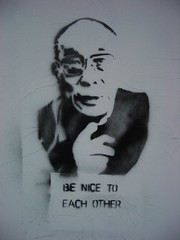 I had a pair of podcasts piped into my ears this weekend that were on very similar topics: how do people manage with their own time and attention AND manage that of other people. The first was Luis Suarez's guest appearance on net@night episode 167: A World Without Email from two weeks ago. And the second was Merlin Mann's Time & Attention Talk (Improvised Rutgers Edition) from April this year. And then Luis goes and tweets a link to Debra Lavoy's piece on Respect 2.0.
I had a pair of podcasts piped into my ears this weekend that were on very similar topics: how do people manage with their own time and attention AND manage that of other people. The first was Luis Suarez's guest appearance on net@night episode 167: A World Without Email from two weeks ago. And the second was Merlin Mann's Time & Attention Talk (Improvised Rutgers Edition) from April this year. And then Luis goes and tweets a link to Debra Lavoy's piece on Respect 2.0.
One of the things that is hard to understand from Luis Suarez's writing about "a world without email" is that it is more than just about his own inbox. And it certainly is not a gimmick. He truly is getting more work done than ever on fewer than 20 work-related emails a week. Listening to him talk makes this much clearer. For example, he said on net@night that he probably could not live on his remote island paradise if he had to live with email as the primary communication mechanism. He'd never be able to get anything done for having to deal with all the email.
And that's where the conversation connects to these other pieces. Could you imagine being able to work "alone" and having managers and co-workers who need to stare over your (virtual) shoulder all the time? This is why people use email so much as a cover-your-backside tool. Email as proof that I was doing something isn't very good use of my time, and it is disrespectful of everyone if that is the expectation in the organization. Why do we tolerate it when we work together?
Merlin Mann argues (and argues) that time and attention are the key resources available to the knowledge worker, and if their whole idea of themselves is tied up in how well they "do" email or how much email they receive and send, then they are not only wasting a whole lot of their time, but they are eating up a lot of time and attention of other knowledge workers who could invest that in much more useful pursuits.
A big part of these ideas, as I hear and read it in these pieces, is that we are each ultimately responsible for what we pay attention to as individuals. If we are always in email, then that must be what is important to us. If we are always in meetings, then meetings must be important. Maybe it is, but don't fool yourself that it is something else. Knowledge workers are in control of what they do - even more than they may think. We have the power to say "Yes" and we have the power to say "No."
The trouble is that many people struggle to say "No" - even if accepting a new task or being dragged into a meeting completely derails other productive work. And this doesn't just happen a few times. We are subject to constant interruption and side-tracks by the very nature of the way we work: always-on and a culture of never-say-no.
Couple never-say-no with another brain twister: The things that are important to me (or that I think are important today), are most likely not important to others. So, when I interrupt you with a request, not only does it break your concentration, if it is a task it drops into a bucket full of other activities which are not nearly as important to you. If I need your help, then I need to fit into your work: you should not have to conform to me. If I want you to think something is important, than I have to get into your shoes and find out why you might give it more importance. Why? Because this is what I would like from you.
This comes down to some key elements about human behavior. We need to learn to say, "No." And we need to remember to treat each other with respect.
[Photo: "Dalai Lama Respect Each Other" by bixentro]